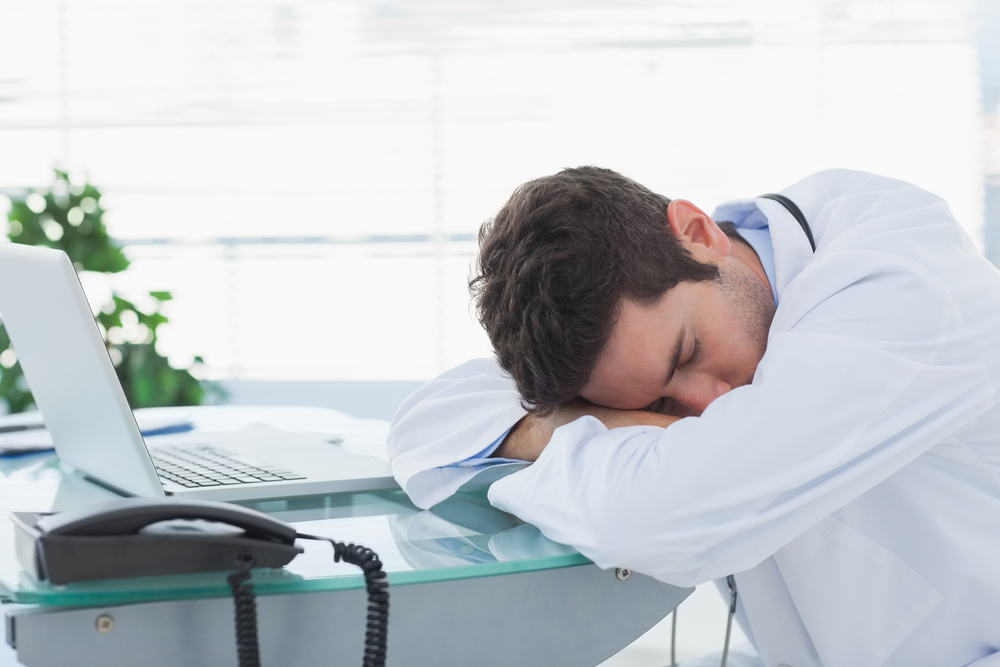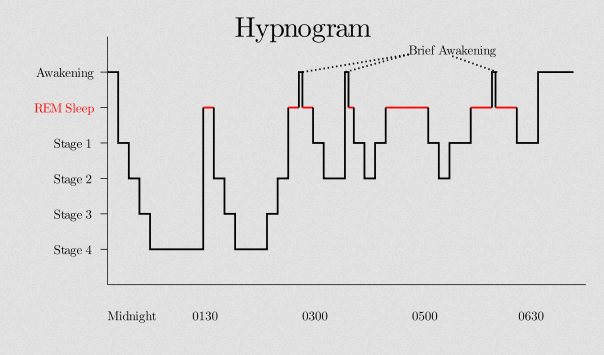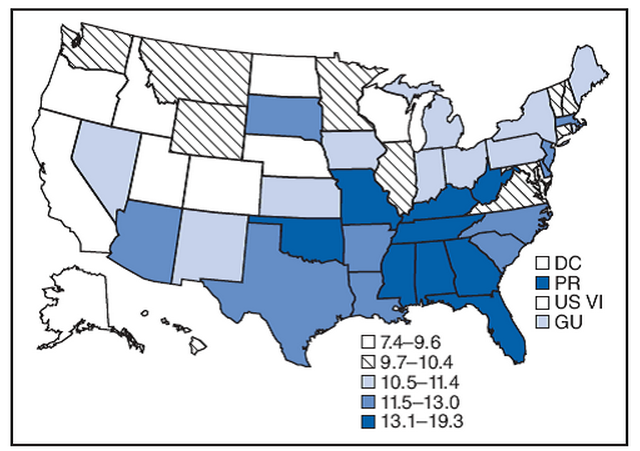/cdn.vox-cdn.com/uploads/chorus_image/image/45658284/shutterstock_197128130.0.0.jpg)
Most people already know that sleep is important and that they should probably get more of it.
But that's only part of the story.
In recent years, researchers have been discovering some bizarre things about the science of sleep. Not sleeping enough can have all sorts of odd side effects, like making people more prone to gambling or more likely to find others attractive. They've found that it's virtually impossible to train yourself to get by with less sleep — if you need 8 hours, it's likely genetic. And that society functions in all sorts of subtle ways to rob us of sleep, from the light in our phones to the way the workday is set up.
To get a better sense of the science of sleep, I spoke to Camilo Ruiz, a sleep specialist with the American Academy of Sleep Medicine. Here are nine surprising facts that came out of our conversation.
1) Scientists still don't know why we need to sleep

"I have no idea why I'm doing this." (Shutterstock)
Scientists agree sleep is essential to our health. But no one's quite sure why that is. "That's one of the beauties of the field," Ruiz said. "We don't know why we sleep."
From an evolutionary standpoint, sleep doesn't make much sense. It forces people to spend one-third of their lives doing what feels like nothing, all while being potentially exposed to predators and unable to hunt for food. Yet despite all of this, the need to sleep has obviously stayed with us — so it must serve some function.
Some researchers theorize that the brain's cleaning system goes into overdrive during sleep. "We think that sleep is a period when the brain actually purges or dumps all the toxins that build up during the day," Ruiz said. "That allows for the brain to rest and reset itself for the next day."
Another theory is that sleep helps us consolidate memory — strengthening memories that might be particularly important, while discarding ones that aren't. The brain might not be able to do this as well when awake. There's a lot of research to support this explanation, but scientists are unclear on the exact mechanisms.
Sleep might help support other bodily functions, too. Some evidence suggests that deep sleep might allow the body to release growth hormones and make proteins associated with tissue repair. Other evidence suggests sleeping might be a way to preserve energy — particularly at night, when it's harder to find food in the wild.
Some experts even theorize that sleep actually helps some species evade predators, since it allows them to hide, be quiet, and be still for a long time. That hypothesis is controversial, though, since sleep does leave people quite vulnerable.
2) You can't train yourself to sleep less. Your need for sleep is largely genetic.

The National Sleep Foundation is pretty clear on its sleep guidelines. Adults aged 18 to 64 generally need seven to nine hours of sleep. Adults 65 and older are generally fine with seven to eight hours. Children can need as much as 17 hours.
That said, there are people who can get by on less sleep. Sadly, you can't train yourself to do this. Multiple studies have found that up to 80 percent of a person's need to sleep is genetic. Other research found that a single genetic mutation might explain why some people can get by on six or less hours of sleep each night.
And it's not just the hours that matter. The key is to reach enough high-quality sleep that the brain recovers in full. "You can be in bed for 12 hours," Ruiz said. "But if the 12 hours are bad quality, you didn't really sleep."
3) Your brain can be just as active during sleep as it is when awake

This chart shows a person's sleep cycle. (RazerM)
A common misconception is that the brain essentially shuts down during sleep. "Not at all," Ruiz said. "Sleep is very active. There's a lot of metabolic activity occurring at night."
Sleep is comprised of four stages and REM — rapid eye movement — sleep, according to the National Sleep Foundation.
The first two stages are very light. These aren't restorative in nature — and you won't feel refreshed if you only hit these two stages during the night.
Stages three and four are deep sleep, also known as "slow wave sleep." "We know now that there are certain hormones that are secreted during that deep sleep," Ruiz said. "This sleep is what helps us feel refreshed in the morning."
REM sleep is the most active stage of sleep. When looking at electrical activity patterns in the brain, Ruiz said REM is as active for the brain as being awake.
"There's different theories on why REM occurs," Ruiz said. "We think that during REM there's intercommunication between neurons and new synapses are being created. It also helps with memory and concentration. And it's typically when we dream."
4) Sleep deprivation can cause bizarre side-effects — like gambling
:no_upscale()/cdn.vox-cdn.com/uploads/chorus_asset/file/3392808/shutterstock_192059984.0.jpg)
Have you ever felt like this? It's dangerous. (Shutterstock)
Everyone knows that not getting enough sleep is bad. Sleep deprivation has been linked to all sorts of negative outcomes, from memory and cognitive problems to heart disease. Excessive sleep deprivation — especially staying awake for days on end — can lead to paranoia, hallucinations, memory loss, mood swings, and trouble with basic movement.
But that's just the beginning.
At a 2014 meeting of the Associated Professional Sleep Societies, researchers shared some of the stranger effects of not sleeping that they'd found. As Susannah Locke reported, these results were preliminary, but striking all the same:
- Sleepiness made men rate photos of "the least attractive models" as more attractive.
- People with less sleep were able to tolerate significantly less pain.
- Subjects with less sleep showed less empathy when viewing photos of hands stung by needles.
- Going without sleep made people less concerned about losing money during gambling.
- Sleepier people were more likely to feel separated from their own body and thoughts.
- Sleepy people were worse at recognizing other people's emotions.
- People who were sleep-deprived very often thought they were doing fine on a classic reaction-time test, even when they were doing worse.
Sleep deprivation is typically only a big deal when it's chronic. If someone gets one bad night of sleep, Ruiz said they should be fine — especially if they take a nap to make up for it. It's only when multiple bad nights accumulate that a lack of sleep can cause serious long-term complications.
5) Americans are sleeping less than they used to. Blame technology.
:no_upscale()/cdn.vox-cdn.com/uploads/chorus_asset/file/3392760/498439227.0.jpg)
An anti-sleeping device. (Artur Debat / Moment Mobile via Getty Images)
The number of Americans sleeping less than six hours a night increased from 7.6 percent in 1975 to 9.3 percent in 2006, according to a 2010 study.
Why the decline? Blame society. Researchers, led by Kristen Knutson at the University of Chicago, attributed this drop in sleep to an increase in full-time work. Other studies have found that people don't sleep enough because the workday and school start too early. (Indeed, there's a very good case for pushing school to later in the day so that students can get more sleep.)
Then there's "social jetlag." The idea is that people are so tired on Mondays because they follow different sleep patterns on workdays and the weekend. On the weekend, they tend to stay out later for socializing. On Monday, they have to get up earlier for work. This creates an effect similar to jetlag — since the body is forced to adjust to different sleep times throughout the week.
Ruiz says new technologies may be to blame as well. "I think a lot of [the decline in sleep] has to do with the advent of the internet, cellphones, smartphones, and people being on their Facebook and Twitter at all hours of the night," Ruiz said.
One recent experiment, led by Anne-Marie Chang of Brigham and Women's Hospital in Boston, found that people who use iPads — or any light-emitting device — before bed are less sleepy at night, take longer to fall asleep, feel less alert in the morning, and spend less time in the REM stage. This is possibly because the blue light is suppressing production of melatonin, the hormone that makes people feel sleep.
6) Japan sleeps less than the US. Canada sleeps more.

A 2013 poll from the National Science Foundation found Americans, who slept an average of 6 hours and 31 minutes on work nights, sleep much less than Canadians, Mexicans, Germans, and the British. Only the Japanese, who slept an average 6 hours and 22 minutes, fared worse. (Only 66 percent of Japanese said their schedule allows for adequate sleep; whereas 72 percent of Americans did.)
But even this misses wide variation in some US states. This map, from the Centers for Disease Control and Prevention, shows the percent of people reporting not getting enough sleep or rest every night in the past 30 days:

The bluer the state, the worse people say that they are sleeping. (CDC)
As the map indicates, people in the South in particular really need to get more sleep. These states already suffer from some of the highest obesity rates in the country — and sleep deprivation may be contributing to that issue.
7) You can't entirely make up for lost sleep on weekends
:no_upscale()/cdn.vox-cdn.com/uploads/chorus_asset/file/3392996/shutterstock_229267837.0.jpg)
There's no bank for sleeping. (Shutterstock)
Some people try to sleep less during the weekdays — perhaps to cope with their work schedules — and then try to catch up on lost sleep in the weekend. But Ruiz said that doesn't really work.
"You can't do that with the brain," Ruiz said. "The brain has a very habitual, routine structure. It likes to have its solid seven hours every night, seven nights a week."
One small study, by researchers at Penn State University, found that binge sleeping on weekends only reverses some of the deficits accumulated throughout a week of sleep deprivation. Even after getting what researchers called "recovery sleep," participants with restricted sleep schedules in the study performed worse on attention tests than they did with healthy sleep schedules.
The real solution, then, isn't trying to make up for lost sleep, but fixing the underlying sleep schedule that leads to binge snoozing. This could also help deal with the effects of social jetlag described above.
8) Some people's sleep disorders can be fatal
:no_upscale()/cdn.vox-cdn.com/uploads/chorus_asset/file/3393300/shutterstock_196097540.0.jpg)
"Please, let me sleep." (Shutterstock)
The CDC estimates that about 70 million Americans suffer from chronic sleep problems. "Seventy million might be even underestimating the reality," Ruiz said. "You talk to most people at any party, and they will tell you they don't sleep well."
Ruiz, who specializes in sleep disorders, said chronic sleep deprivation is the most common problem. Trouble breathing, particularly sleep apnea, and insomnia come next. There are also all sorts of smaller problems that can become disorders if they lead to serious complications, such as sleepwalking and sleep-talking.
For a very small number of people, there's fatal familial insomnia. Science news outlet io9 explained the phenomenon:
The first case of fatal familial insomnia shocked the world in 1984. An Italian man named Silvano, in his mid-fifties, with no history of major sleep problems, checked into a prominent sleep clinic. He had completely lost his ability to sleep. For most of us, having 'insomnia' means not being able to sleep for a couple of hours when going to bed. Sufferers of FFI are unable to sleep at all, sometimes for months. The man whose arrival at that clinic in Bologna first brought the condition to the world's attention, died after four months of documented insomnia. Then, and now, doctors have no explanation for his death.
Most people's sleep problems don't ever get anywhere close to this serious. But even some chronic sleep deprivation can lead to serious health issues or all sorts of bad judgments, including "drowsy driving" that can lead to fatal accidents.
Sleep disorders can generally be treated with medication and therapy. Depending on the cause and issue, doctors will sometimes need to monitor patients as they sleep to gauge the extent of the problem.
9) Sleep sex and eating are real problems
:no_upscale()/cdn.vox-cdn.com/uploads/chorus_asset/file/3393328/shutterstock_169470218.0.jpg)
One at at a time — hopefully. (Shutterstock)
Parasomnias are disorders that cause people to do things while sleeping. The most well-known are sleepwalking and sleep-talking. But there are rarer, potentially riskier variations: sleep sex and eating.
That's not as amusing as it sounds. In a 2002 study, Stanford University researchers found some cases in which people engaged in "rape-like behavior toward bed partners" while they were sleeping. There are also some cases of sleep sex that are disruptive but not dangerous to partners, such as loud moaning. People don't typically remember doing these acts the following day.
People can also experience severe sleep eating. As WebMD explained, sleep eating can occur so often that a person will gain weight or potentially risk developing type 2 diabetes — without even knowing what they're doing.